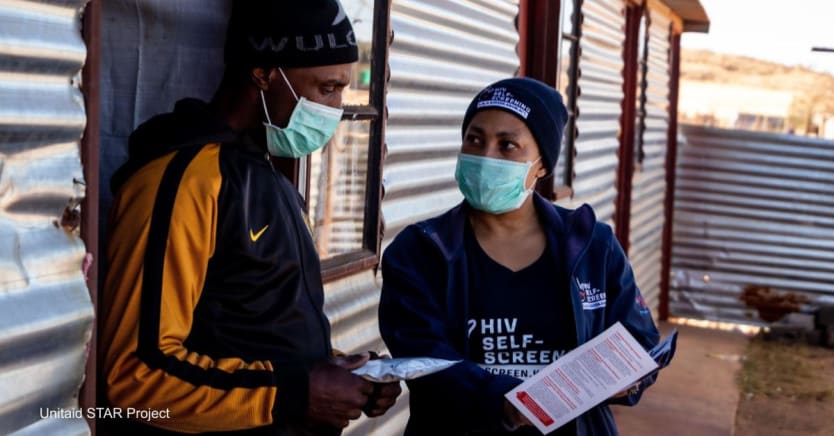
Today, half of the world’s population lacks access to essential health services, leaving billions without the care they need. Achieving universal health coverage by 2030 requires more than just strengthening existing systems — it demands a fundamental shift in how health care is delivered.
Self-care plays a critical role in this shift by expanding access to services, easing the burden on overwhelmed health systems, and empowering individuals to take control of their health.
Innovations in self-care encompass many aspects of care. New diagnostics, devices, drugs, and digital health tools are transforming the way people interact with the health system. Technologies such as self-testing for HIV, COVID-19, and hepatitis C are among the most promising innovations for improving health and well-being — both from an individual perspective and a health systems perspective.
By making self-testing more accessible, acceptable, and affordable, these tools offer individuals greater choice and autonomy, foster self-determination, and promote deeper engagement in managing their health.
Closing diagnostic gaps with self-testing
Self-testing and self-sampling are bridging diagnostic gaps, offering alternatives to conventional provider-led testing.
The introduction of HIV self-testing, or HIVST, in low- and middle-income countries marked a pivotal moment in global health, laying the groundwork for a self-care revolution. HIVST first gained momentum with the Unitaid-funded Self-Testing Africa, or STAR, initiative in 2015 and was endorsed by the World Health Organization a year later. The contribution of HIV self-testing has been instrumental in increasing the percentage of people living with HIV who know their status. In 2015, an estimated 67% of people living with HIV globally were aware of their HIV status. By 2023, this figure had increased to 86 %.
The STAR initiative has three key goals:
Catalyze the global market for self-testing.
Generate evidence for decision-making.
Create an enabling environment for self-testing scale-up.
Population Services International and the STAR consortium led the catalytic investment to achieve the scale-up of HIVST in high-burden countries. STAR has transformed the global self-testing market and expanded beyond HIV to include self-testing for other diseases such as hepatitis C and COVID-19.
Before 2015, the number of HIV tests conducted annually was increasing, yet those at highest risk — such as men who have sex with men, sex workers, and people who inject drugs — were being missed by traditional testing methods. This realization, along with the push to meet the United Nations' 90-90-90 targets by 2020, highlighted the need for more effective and targeted testing.
HIVST emerged as a transformative solution to increasing testing uptake, providing autonomy and discretion, particularly among populations who had previously been hesitant to test. In southern and eastern Africa, the scale-up of HIVST was accelerated by Unitaid's catalytic investment in the STAR initiative, with additional support from major donors like The U.S. President's Emergency Plan for AIDS Relief, or PEPFAR, the Global Fund to Fight AIDS, Tuberculosis and Malaria, the Children's Investment Fund Foundation, the Gates Foundation, and governments’ own investments.
The importance of HIVST became even more evident during the COVID-19 pandemic, when access to traditional health services was restricted by lockdowns. HIVST kits were distributed through online pharmacies and integrated with digital technologies to facilitate the testing process and reporting by users. This ensured continued access to lifesaving antiretroviral therapy for those who tested positive, while also supporting prevention services like preexposure prophylaxis.
As a result of the STAR initiative, demand for HIVST kits saw a dramatic increase from 500,000 to over 30 million in the procurement pipeline between 2019 and 2024. The increasing demand attracted more manufacturers, leading to a wider range of available products. Today, there are six WHO-prequalified HIVST products in the market along with one additional product approved by the Global Fund Expert Review Panel for Diagnostics, and several more in the pipeline. This market expansion provides clients with more choices and fosters market competition, resulting in lower HIVST kit prices.
The STAR initiative and other research have explored additional use cases for HIVST, leading to the 2023 WHO recommendation to expand HIVST use for preexposure prophylaxis initiation, continuation, and reinitiation, promoting HIVST through sexual and social networks (for example, encouraging people to share self-testing kits with their sexual partners, family members, or friends), and offer HIVST at facilities to improve service delivery efficiency.
A road map for other self-testing interventions
The introduction and scale-up of HIVST provided the infrastructure for self-testing of other infectious diseases. During the COVID-19 pandemic, only 20.4% of global tests were conducted in low- and middle-income countries, even though they account for over half of the world’s population. This underscored the urgent need for alternatives to costly, labor-intensive polymerase chain reaction, or PCR, testing. Self-sampling and self-testing quickly emerged as effective solutions, particularly when used at home, reducing transmission risk and exposure.
A catalytic investment from Unitaid and FIND in 2021, implemented in seven countries across three continents, contributed to WHO's guidance on COVID-19 self-testing and led to the registration of three low-cost self-tests. Thanks to early insights gained from HIVST, the timeline to receive WHO guidance for COVID-19 products was significantly shortened .
The testing gap for hepatitis C is even wider than HIV, with only 26% of people living with chronic hepatitis aware of their status. Stigma and discrimination as well as extremely low access to testing services — particularly among people who inject drugs — are the major barriers to testing uptake. Hepatitis C self-testing, or HCVST, offers a solution. In 2021, HCVST was integrated into the STAR initiative and implemented in five countries across Africa and Asia.
Self-testing is the future
The STAR initiative's pioneering work in self-testing continues to catalyze the introduction of newer technologies, such as multiplex self-test kits, which have the potential to further revolutionize health care.
By combining multiple tests into a single kit, multiplex self-testing provides users with a more affordable and accessible option. Additionally, by simplifying procurement and distribution, multiplex kits benefit health programs and governments while supporting a more integrated response, especially in regions with overlapping disease burdens. For example, offering multiplex self-tests to pregnant women in areas with high rates of HIV and syphilis co-infection can optimize the identification and management of these diseases, reducing mother-to-child transmission and improving health outcomes.
Join the self-care revolution
Self-testing has transformed health care by expanding access and easing the strain on health systems. As we aim for universal health coverage by 2030, self-testing must be a core strategy. The success of HIV self-testing provides a powerful road map for addressing other infectious diseases, including hepatitis C, hepatitis B, STIs, and COVID-19. It also highlights the potential of multiplex self-tests to address multiple health issues at once.
Now is the time to invest in self-care and self-testing, integrating them into public health policies and programs. We must continue to innovate, broaden access, and ensure self-testing is affordable and available to all. By doing so, we can close diagnostic gaps, improve individual health, and bring quality care to those who need it most. Let’s harness the full potential of self-testing to achieve universal health coverage by 2030, building a future where everyone can take control of their health.








